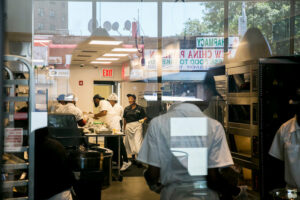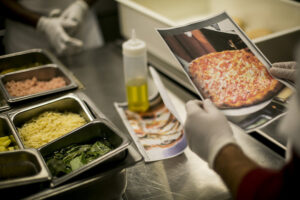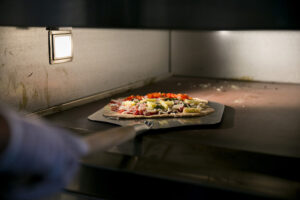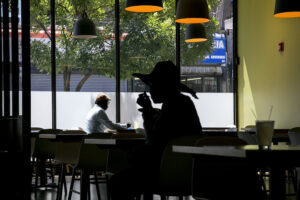
It’s morning at the Brownsville Community Culinary Center (BCCC) and the colorful café and restaurant are closed. Parliament Funkadelic is playing over the speakers, and in the open kitchen at the back of the dining room, participants in black chef coats cut chicken breasts into strips as prep for a catering order, some nodding their heads to the music as they complete their work while some laser-focused on their tasks.
In a classroom behind the kitchen, 10 participants learn about nonverbal communication. April Grigsby, BCCC’s social services director, is leading the lesson and is having the group act out “negative or angry” body language. The group is divided into pairs that are shaking fists at one another and rolling their eyes in mock anger, before Grigsby interjects. “Have you interacted with someone who’s acted like this or have you acted like this yourself?” she asks the group. After a resounding “yes,” she asks if they prefer working in a quiet or loud environment, alone or in a group. “You need to know your communication strengths,” she says. “It can impact the culinary environments that are going to be best for you.”
BCCC opened in June 2017, the result of a serendipitous meeting at Scratchbread Bakery (RIP) in Bed-Stuy between Lucas Denton, a former hospitality worker, and Claus Meyer, a culinary entrepreneur (he’s co-founder of the world-renowned restaurant Noma) as well as founder and chairman of the Melting Pot Foundation, the nonprofit behind BCCC that aims to improve “future opportunities and quality [of] life of communities from vulnerable sectors” through food.
Denton, now the director of content and communications, sees BCCC as a community organization. “When I came to Brownsville in 2014 I thought, ‘How can we be useful?’ and from that conversation onward I’ve listened to the community,” he says. BCCC offers a 40-week paid training program, teaching a rotating cohort of local Brownsville residents culinary arts skills while directly helping them build careers in food. The center itself is a sit-down café and restaurant for local residents that offers a 50 percent discount to SNAP recipients. “One thing I always try to emphasize is this is Brownsville’s creation,” he says. A team of culinary arts teachers, advisers and social workers run the program, but the restaurant and café are all staffed by participants.

BCCC’s program is holistic, focusing on nurturing and growing the participants’ love of food and cooking while also teaching them about the food and history of the African diaspora alongside soft skills that they can use in their careers.
Susan Frankson, a former Brownsville resident, is technically the head baker at BCCC, but she also mentors participants and shares her experiences in the restaurant industry. “Most of them haven’t worked in the industry, so I try to make them develop good habits because bad habits will get you in trouble in somebody else’s kitchen,” Frankson says. She monitors their physical health by administering blood pressure tests via a manual blood pressure cuff that she brought to the center. After she checks the students blood pressure she asks them if they’ve been sleeping well. Her attitude is more like a concerned parent instead of just a baking instructor.
The café is where participants learn how to work in a restaurant, and the menu focuses on the influence of the African Diaspora through dishes like jerk chicken pizza, tri-color carrot and peanut salad and Caribbean fish stew. MJ Sanders, operations director for BCCC, feels that this focus gives participants a chance to learn about history and see similarities in the foods that they eat today. “When I was in culinary school we didn’t talk about the African Diaspora at all,” Sanders says. “We’re different in that we offer that and we talk about history.”

The breadth of lessons catch some participants off guard. “I didn’t expect for them to teach me different things like the bakery or back-of-house cooking and making dough and stuff. but it’s really interesting to me,” says Eric Stroman, a 27-year-old participant. “Learning all of these different things, that’s what motivates me now to want to learn more and use my skills.” Deanna Turner, a 24-year-old Brownsville native who joined the program after seeing a sign outside of the center, wants to open her own restaurant some day, serving dishes inspired by her Jamaican heritage. “I was just walking one day and I saw the sign and I was like, ‘I want to do it,’” she says.
Participants have gone on to work at brands like the Food Network and at some of the top kitchens in New York City, including Ovenly, Egg, Reynard, the Great Northern Food Hall and the Norman (the last two are both Claus Meyer properties), and no matter where they go, they’re always welcome at BCCC. In that way BCCC is much more than a culinary training program. “It’s personal and career development,” says Sanders.







